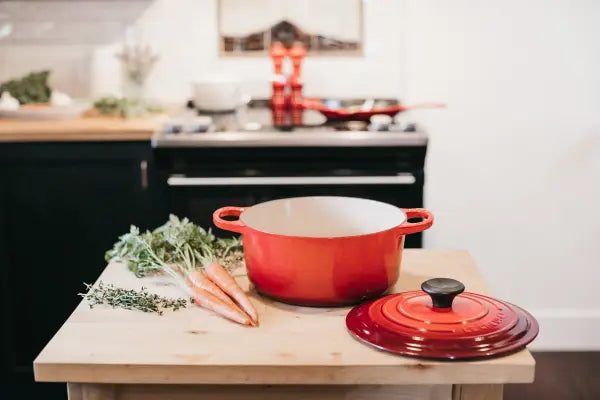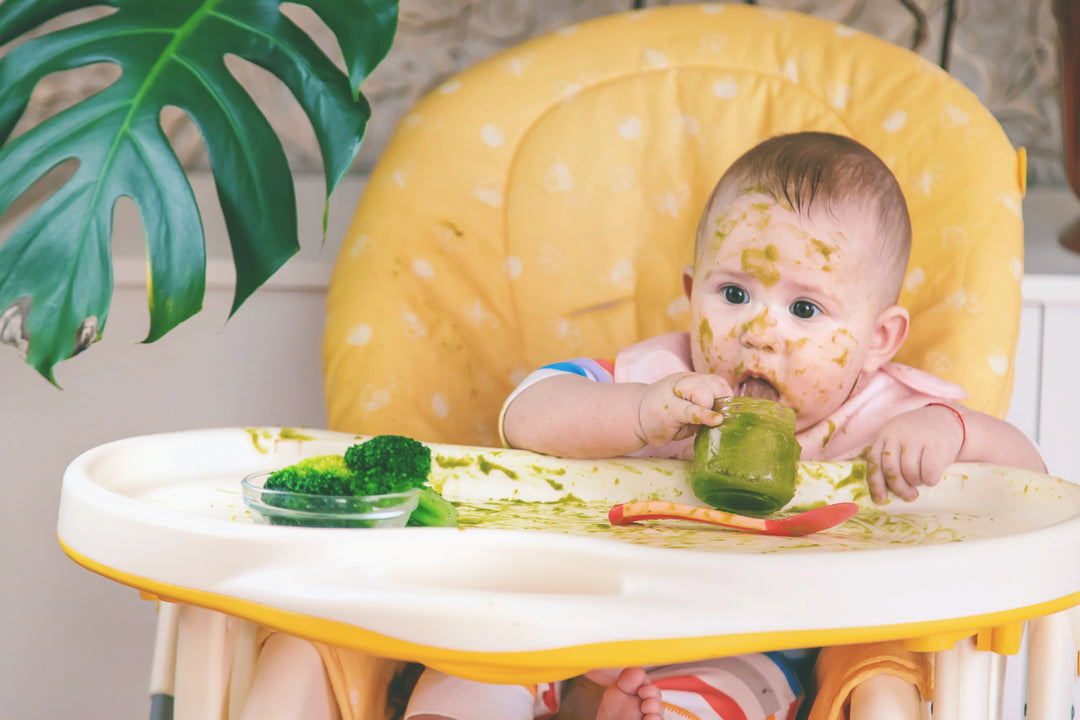Carrots for babies: when can they eat them, how to prepare, and recipe ideas

Starting solids can feel overwhelming, but some vegetables make the process easier, and carrots are one of them. Naturally sweet, versatile, and easy to prepare, carrots are a great first food for babies, whether you’re starting with purées, finger foods, or a mix of both.
In this post, we’ll cover when to introduce carrots to babies, their nutritional benefits, how to prepare them safely, and five simple baby-friendly carrot recipes you can make with little effort.
When can babies eat carrots? (Signs to look for)
Most babies can start eating carrots around 5–6 months of age, once they’re showing signs of readiness for solids.
Signs your little one may be ready to try carrots
-
Sitting with minimal support
-
Showing interest in food (leaning forward, reaching for your plate)
-
Ability to bring food to their mouth
-
No longer pushing food out with the tongue (less tongue-thrust reflex)
Carrots are naturally high in beta carotene, which the body converts to vitamin A to support vision, skin health, and immunity. They’re also packed with fiber, vitamin C, and antioxidants.
According to the CDC, carrots are a safe first food when prepared appropriately for your baby’s age and development. The CDC emphasizes starting solids around 6 months, focusing on simple single-ingredient foods like vegetables.
If you’re unsure when to start, always check with your pediatrician. Every baby is unique, and developmental readiness is more important than age alone.
Are carrots good for babies? nutrition benefits made simple
Key nutrients carrots provide for babies
Carrots aren’t just easy—they’re nutrient-packed:
-
Vitamin A (from beta carotene): supports eye development and immune function
-
Vitamin C: helps with iron absorption and overall immunity
-
Fiber: supports digestion and healthy bowel movements
-
Antioxidants: promote cell health and reduce inflammation
Helping your baby absorb vitamin A from carrots
Pairing carrots with healthy fats, like olive oil or avocado, helps your baby’s body absorb vitamin A more effectively. This is why roasting carrots with a drizzle of oil or serving them alongside avocado can be especially beneficial.
How to prepare carrots for babies in safe, baby-friendly ways
Carrots by age: purées, sticks, and family meals
-
5 months: Cooked and blended into a smooth purée
-
6–9 months: Large steamed or roasted carrot sticks for baby-led weaning, or smooth purées for spoon-feeding
-
9–12 months: Soft diced or roasted carrot rounds
-
12 months+: Add to soups, veggie patties, or family meals
Are carrots a choking risk for babies? What parents should know
Raw carrots can be a major choking hazard for young children. Avoid raw sticks until at least 2–3 years of age. Even then, slice lengthwise into thin strips or grate them for safety. When starting solids, it’s important for parents to know the difference between gagging and choking, as well as what to do when a baby chokes.
How to cut and cook carrots safely for little eaters
The key with carrots (and all early solids) is texture. They should be soft enough to squish between your fingers for younger babies, and gradually firmer or smaller as your child grows.
Carrot recipes for babies: 5 simple ideas to try at home
Here are five easy ways to serve carrots, from first purées to toddler-friendly finger foods.

Smooth carrot purée (best for 5-6 months)
Ingredients
-
2–3 medium carrots, peeled and chopped
-
2–3 tablespoons breast milk, formula, or water (for blending)
-
Optional: 1–2 tablespoons cooked apple, pear, or sweet potato for variety
Directions
-
Steam or boil carrot chunks until very soft (10–12 minutes).
-
Transfer to a blender or food processor.
-
Add liquid a little at a time until smooth.
Why it works: Smooth purées are perfect for spoon-feeding beginners, helping babies adjust to solids while still getting familiar flavors.

Roasted carrot sticks (a first finger food for 6+ months)
Ingredients
-
2–3 large carrots, peeled and cut into thick sticks
-
1–2 teaspoons olive oil
Directions
-
Preheat oven to 400°F (200°C).
-
Toss carrot sticks in olive oil.
-
Place on a baking sheet and roast for 20–25 minutes, until soft enough to squish between your fingers.
-
Cool slightly and serve.
Why it works: Roasting brings out carrots’ natural sweetness, making them appealing even for picky babies.

Carrot apple mash (6+ months)
Ingredients
-
2 carrots, peeled and chopped
-
1 apple, peeled, cored, and chopped
-
1–2 tablespoons water or breast milk (if needed)
Directions
-
Steam carrots and apple together until very soft.
-
Mash with a fork for a chunkier texture, or blend until smooth for younger babies.
-
Thin with liquid if needed before serving.
Why it works: Apples add extra sweetness and vitamin C, which helps the body absorb iron from other foods.

Carrot pancakes (a fun option for 9+ months)
Ingredients
-
½ cup rolled oats (blended into flour or left whole)
-
1 small banana, mashed
-
1 egg
-
2–3 tablespoons milk of choice (breast, formula, or whole milk)
-
¼ cup finely grated carrot
Directions
-
Mix all ingredients in a bowl until combined.
-
Heat a nonstick skillet over medium heat.
-
Spoon batter into small rounds (2–3 inches wide).
-
Cook 2–3 minutes per side, until golden and cooked through.
-
Cool slightly before serving.
Why it works: These pancakes are nutrient-dense, easy to hold, and a fun way to introduce different textures.

Carrot lentil soup (protein-packed and cozy for 6+ months)
Ingredients
-
½ cup red lentils, rinsed
-
2 carrots, peeled and chopped
-
½ small onion, diced
-
2 cups low-sodium vegetable broth or water
-
Pinch of mild spices (optional: cumin or turmeric)
Directions
-
Heat a drizzle of oil in a saucepan, then sauté the onion until soft.
-
Add carrots, lentils, broth, and optional spices.
-
Simmer until carrots and lentils are very soft (about 20 minutes).
-
Blend for a smooth soup, or leave slightly chunky for older babies.
Why it works: Lentils add plant-based protein and iron, making this a filling and nutritious meal for growing babies.
Bonus: a family-friendly carrot soup everyone can enjoy
One of our favorite ways to make carrots work for everyone at the table is a simple carrot and sweet potato soup. It’s naturally creamy, slightly sweet, and easy to adapt for both babies and adults.
Ingredients
-
3–4 carrots, peeled and chopped
-
1 sweet potato, peeled and diced
-
1 small onion, chopped
-
1 garlic clove, minced
-
1 tablespoon olive oil
-
3 cups low-sodium vegetable broth
-
Optional toppings: Greek yogurt, fresh herbs, spices (for adults)
Directions
-
Heat olive oil in a pot. Sauté onion and garlic until fragrant.
-
Add carrots and sweet potato, stirring for a few minutes.
-
Pour in broth, bring to a boil, then simmer until veggies are soft (20–25 minutes).
-
Blend until smooth.
-
Serve plain for babies, and add yogurt, herbs, or spices for the rest of the family.
Tips for serving carrots without the stress
-
Always check texture before serving—carrots should match your baby’s stage
-
Try steaming, roasting, or boiling for different flavors
-
Pair with healthy fats (like olive oil or avocado) for better vitamin absorption
-
Rotate with other orange veggies like sweet potato, butternut squash, or pumpkin
-
Model eating carrots yourself—babies love to copy you
For more real-life feeding strategies, Kids Eat in Color shares practical, judgment-free advice on how to expose kids to vegetables in positive ways.
Final thoughts: why carrots make an easy, versatile first food
Carrots are one of the easiest and most versatile first foods for babies. Whether you start with purées or baby led weaning, carrots can be adapted for every age and stage.
By keeping it simple with single-ingredient recipes and gradually increasing texture, you’ll help your baby develop a positive relationship with food—while making your life a little easier at mealtime.
For even more first food recipes and seasonal ideas, explore the Bébé Foodie app. You’ll find purées, finger foods, and combos that grow with your baby.

Written by Whitney Cardosi
Chef & Advisor at Bébé Foodie
Whitney Cardosi is a recipe developer and the founder of Wellness with Whit, where she helps millennial moms simplify health and nutrition through coaching, cooking classes, and workshops. At Bébé Foodie, Whitney brings her passion for joyful, stress-free family meals to life with nourishing recipes designed for little ones and their parents. She's also the author of In the Kitchen: Healthy Meals You’ll Actually Enjoy, a cookbook full of family-friendly inspiration.




Leave a comment